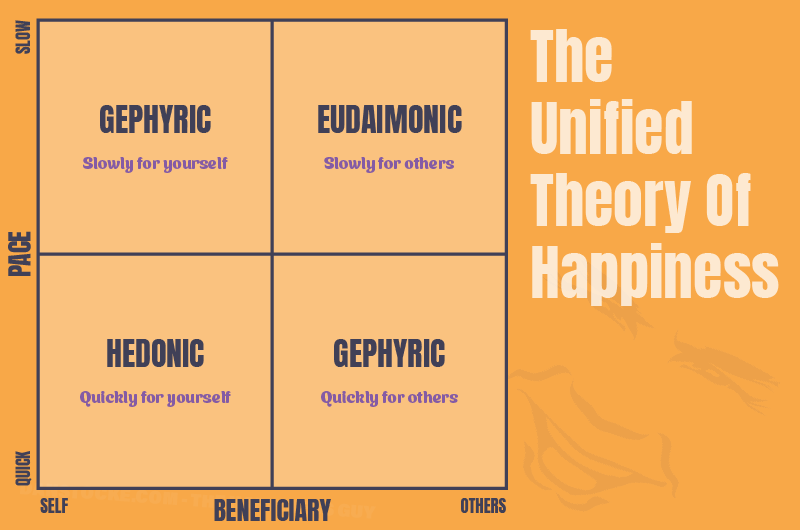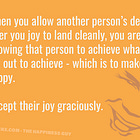The Unified Theory Of Happiness: Gephyric Happiness
Happiness is both the small and the large, it’s the shallow and the deep, it’s the mundane and the overwhelming. It's all of it all at once.
Everyone has their own definition about what happiness actually is. Some think it is a reaction to pleasure. Some think happiness is an achievement. Others, yet, believe it is a state of being (Ohm…). It can be all of those things, and then again, maybe, none of them (depending on your personal preference). Humans have been trying to land on a good definition of happiness, and thus how to achieve it, since… forever—or at least for the last 2,525 years
Here is a (short) list of humankind’s history with defining Happiness1 - apologies in advance if my truncated paraphrasing clubs to death the nuance of any of these schools of thought:
Taoism (571-471 BCE) Happiness is not about trying so hard but in being useless and free to do anything. The OG “go with the flow”.
Confucius (551-479 BCE) Happiness is all about harmonious relationships. When everyone behaves like decent human beings, society won’t go to shit2.
Buddhism (480-400 BCE) Happiness is the art of realizing that craving stuff makes you miserable. So, maybe, don’t do that.
Aristotle (384-322 BC) Happiness is the ultimate pursuit, even though—in one of the most bummer revelations ever conceived—the pursuit of it might not be all that fun.
Epicurus (341-270 BC) Happiness is in enjoying simple pleasures and not stressing out about it too much.
Cicero (106-43 BC) Happiness is about living virtuously, guided by reason, duty, and moral goodness (yawn!)
Thomas Hobbes (1588-1679) Happiness is the never-ending pursuit of continual desire driven by self interest. The original grind culture bruh.
John Locke (1632-1704), Happiness is a natural right. Don’t ruin it for others by being a jerk.
Jeremy Bentham (1748-1832) Happiness is a mathematical equation. Add up pleasures, subtract out pain, and multiply across a population. Cold, hard, happy-math.
Looking at a couple thousand years of happy thinking, even though what defines happiness is different, one thing is clear: happiness is a concept worth pursuing. Most philosophies broadly suggest that happiness is considered the increase of pleasure with a subsequent decrease of pain, but then we get into questions of what do we mean by pleasure and what exactly is pain? There is an ongoing discussion of how individual desires can coexist with the virtues necessary to be a good person in the world. Pleasure is simply the act of giving into your desires, but cultivating virtue sounds like work—commonly referred to as “pain”.
It’s within this struggle between desire and virtue that we get a sense of the yin and yang of two different schools of thought about what happiness is: Hedonic and Eudaimonic3.
HEDONIC (FAST HAPPY)
Hedonic4 happiness is all short term, get while the getting’s good kind of stuff. Sex, Drugs, and Rock-N-Roll! Woo-hoo! Life is awesome right now! LET’S GET AT IT! Hedonic happiness is all about achieving happiness through enjoying experiences in the moment. Hedonic is all desire.
EUDAIMONIC (SLOW HAPPY)
Eudaimonic5 happiness is playing the long game. This is about finding purpose and striving for personal excellence through meaningful endeavors. Eudaimonic happiness concerns the experience of living a whole life finding individual purpose within a larger entity, be it family, community, nature, and/or the whole of humanity. Eudaimonic is all virtue.
If we were to graph these two it would look something like this:
Much of the history of happiness revolves around the struggle between get happy quick schemes and longer term, purpose built happiness. Which one is better? Which one is worse? Many philosophers once denounced hedonic happiness as “philosophy of swine” because it emphasized sensory pleasures. They forgot that stopping to smell the flowers is hedonic6.
Of course the reality is that both are true and play off each other. You can’t always be smelling flowers as you would be neglecting other parts of your life. On the flip side, the dedication to aspiration above the distraction of temptation is going to have you wondering what all the fuss is about with smelling flowers.
Yet the two concepts leave giant holes to be filled. While the two adherents are off either smelling flowers or becoming one with the universe, they are leaving giant gaps in what it means to achieve happiness. We need a filler.
GEPHYRIC HAPPINESS
In the interest of adding to humankind’s struggle with defining happiness, I have decided to pile on with The Unified Theory Of Happiness: “Gephyric Happiness” fills the gap between short term all-about-yourself style happiness and the long term always-for-others kind. We need to consider what it means to strive for happiness slowly for yourself and/or quickly for others.
These two concepts already exist in our lives but were given short shrift throughout the history of happiness. They need a longer shrift7.
GEPHYRIC (SLOWLY FOR YOURSELF)
Gephyric Happiness8 can be found by allowing yourself time to enjoy your own life slowly. This is where you take family vacations, or spend time in your she-shed. This quadrant is about finding happiness in self-reflection, understanding who you are, and enjoying that.
GEPHYRIC (QUICKLY FOR OTHERS)
Gephyric Happiness can also be found in day-to-day, moment-to-moment interactions with other people. This is where you find compliments and random acts of kindness. This is happiness found in the smile of a stranger. This quadrant is about sharing happiness with others.
I could have come up with different (Greek based) names for the different quadrants, but that would have been too much work. There doesn’t need to be all these different quadrants. Taking the graph as a whole it becomes very apparent that happiness is found in all of it. Happiness is not just in the details but also in the overall. Happiness is the small and the large, it’s the shallow and the deep, the mundane and the overwhelming. It’s kindness for yourself and kindness for others. It's all of it all at once.
You can have your individual desires and strive for virtue at the same time. There is happiness in everything.
Enjoy it all.
IF YOU LIKE THIS
please press the ❤️ at the top or bottom of this page,
click the 💬 to leave me a comment (I’d love to hear from you),
or if you want to go nuts, hit the 🔄️to share this on your own socials.
All of it helps others to find this post, and me to find other readers.
FURTHER READING
A Review of Western and Eastern Traditional Views of Well-Being: David Publishing
I know of a certain world leader that could use a little Confucianism in his life.
Eudaimonic And Hedonic Well Being: Psychopedia
The word “hedonic”, like so many good words, comes from the Ancient Greek “hēdonē” meaning “pleasure”, which wasn’t enough, so the English slapped the adjectival suffix “ic” onto it. It dates back to 1656 where it was used to describe philosophical concepts of pleasure.
The word “eudaimonic” comes from the Ancient Greeks (again) when they took “eu” meaning “good” and “daímōn” meaning “spirit” and put them together to literally mean “good spirit”. Aristotle used “eudaimonia” to refer to the highest human good. Then the English came along in the mid-19th century and, once again, slapped the adjectival suffix “ic” on it so they could use it to describe things that produce human flourishing.
Or, perhaps, they were born before that pithy quote was coined.
The word “shrift” is an Old English word meaning “confession to a priest - specifically before an execution!” So to be given “short shrift” means not being given a lot of time to confess your sins before losing your head. Interestingly, it’s derived from the Latin “scribre” meaning “to write”. Considering the length of this article, I have definitely given it “longer shrift”.
If we’re going to stick with the Greek way of labeling things: The word “gephyric” comes by slapping the English adjectival suffix “ic” on the Ancient Greek word “gephyra” meaning bridge. It dates back to April 24, 2025 when The Happiness Guy, a Substack written by Dan Stocke, used it to describe the Unified Theory Of Happiness (UTOH).










